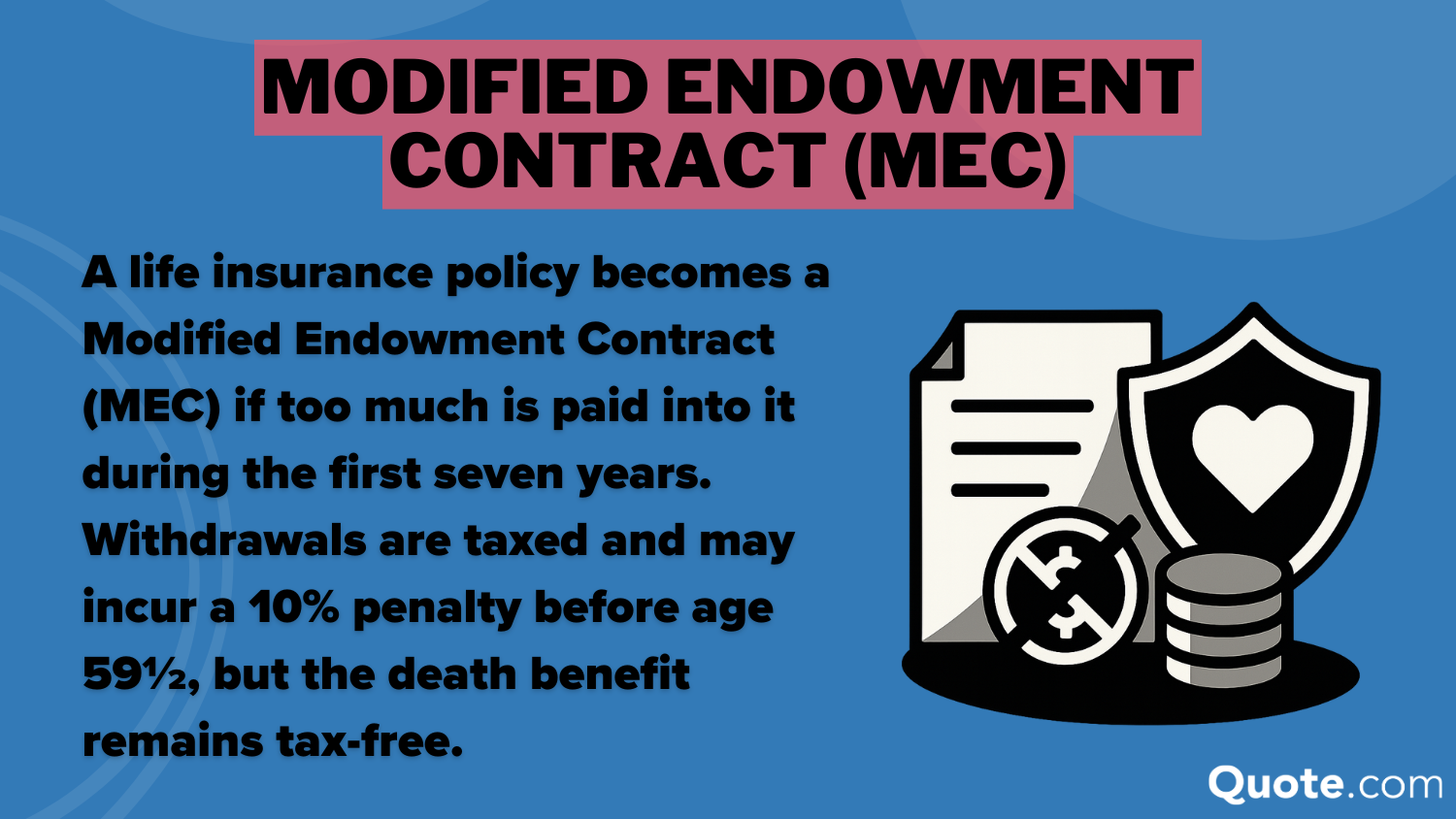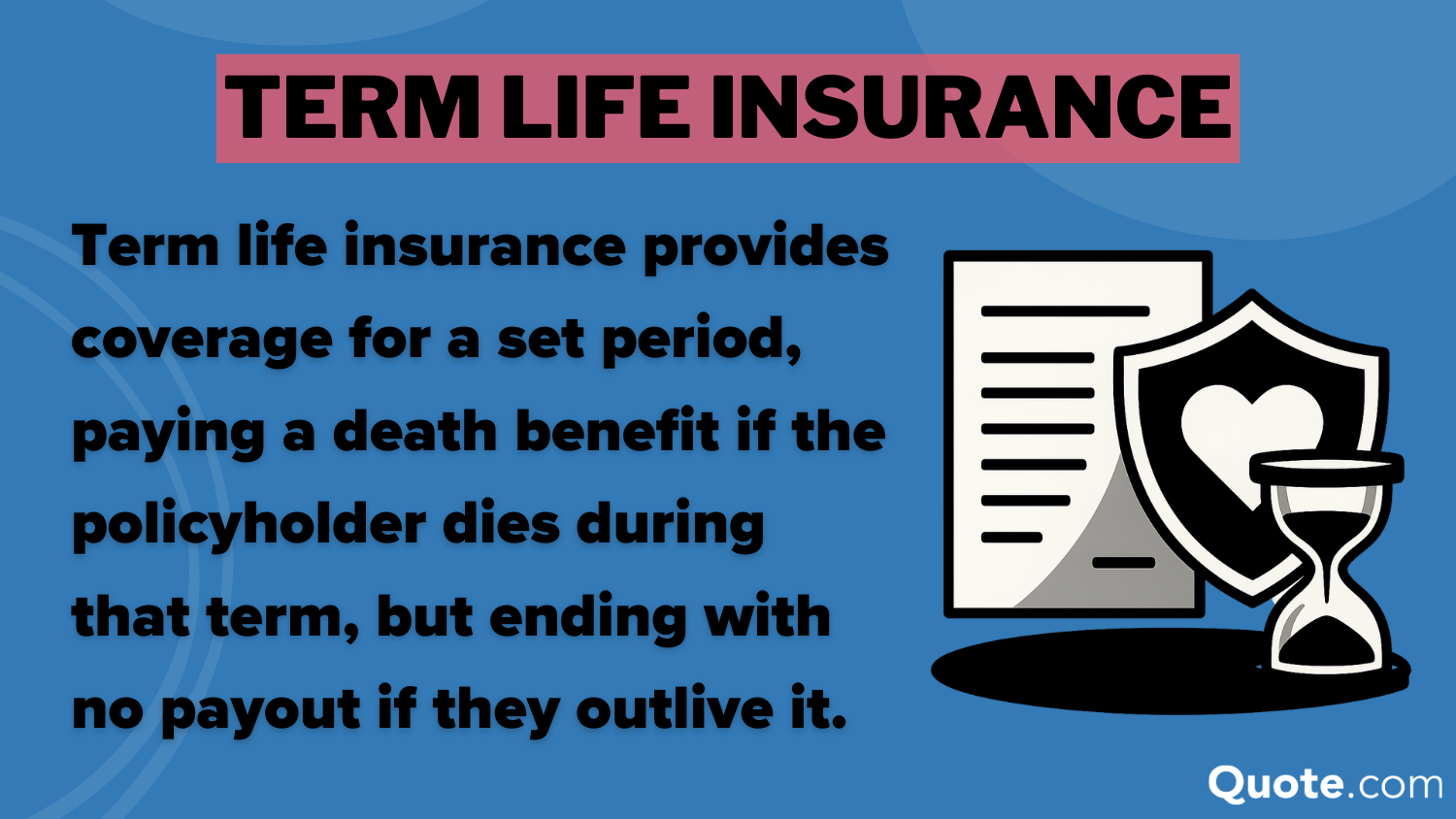Modified Endowment Contract (MEC)
Learn what a Modified Endowment Contract (MEC) is, how it affects taxes on your life insurance policy, and when it might make sense for estate planning or wealth transfer.
Secured with SHA-256 Encryption




Table of Contents
Table of Contents


Head of Content
Meggan McCain, Head of Content, has been a professional writer and editor for over a decade. She leads the in-house content team at Quote.com. With three years dedicated to the insurance industry, Meggan combines her editorial expertise and passion for writing to help readers better understand complex insurance topics. As a content team manager, Meggan sets the tone for excellence by guiding co...
Meggan McCain


Senior Director of Content
Sara Routhier, Senior Director of Content, has professional experience as an educator, SEO specialist, and content marketer. She has over 10 years of experience in the insurance industry. As a researcher, data nerd, writer, and editor, she strives to curate educational, enlightening articles that provide you with the must-know facts and best-kept secrets within the overwhelming world of insurance....
Sara Routhier


Commercial Lines Coverage Specialist
Michael Vereecke is the president of Customers First Insurance Group. He has been a licensed insurance agent for over 13 years. He also carries a Commercial Lines Coverage Specialist (CLCS) Designation, providing him the expertise to spot holes in businesses’ coverage. Since 2009, he has worked with many insurance providers, giving him unique insight into the insurance market, differences in ...
Michael Vereecke
Updated November 2025
A Modified Endowment Contract (MEC) is a life insurance policy that fails the IRS’s 7-pay test, resulting in different tax treatment compared to standard life insurance. While a typical life insurance policy allows for tax-free access to cash value and death benefits, a MEC is treated more like a taxable investment.
Understanding MECs is important for anyone using life insurance as a wealth-building or estate planning tool—especially if you’re contributing large sums to the policy early on.
Types of Life Insurance That Can Become MECs
Most commonly, permanent life insurance policies can become MECs if they are overfunded. These include:
- Whole life insurance
- Universal life insurance
- Variable life insurance
- Indexed universal life (IUL) insurance
Term life insurance does not accumulate cash value and therefore cannot become a MEC.
Any permanent policy with a cash value component is subject to the 7-pay test and can be reclassified as a MEC if it receives excessive premium payments in a short time period.
Free Life Insurance Comparison
Compare Quotes From Top Companies and Save
Secured with SHA-256 Encryption
How a Life Insurance Policy Becomes a MEC
A life insurance policy becomes a MEC when the total premiums paid into the policy exceed federal limits during the first seven years. These limits are determined by the 7-pay test, which is designed to prevent people from using life insurance as a tax shelter.
There is no special election or form needed. If your payment schedule fails the test, the IRS automatically reclassifies the policy as a MEC. Once that happens, the change is permanent.
The 7-Pay Test: Explained Simply
The 7-pay test evaluates whether you’ve paid too much into a life insurance policy during the first seven years. Specifically, it checks if your total premium payments exceed the amount needed to fully pay up the policy in seven annual payments.
Example:
If you buy a whole life policy that could be paid off with $5,000 per year over seven years, contributing $10,000 in any one year would cause the policy to fail the 7-pay test—making it a MEC.
There is no appeals process or workaround. Once a policy fails the 7-pay test, it becomes a MEC and stays that way—even if you stop making excess contributions later.
Why MECs Matter: Tax Consequences
The biggest difference between a MEC and a standard life insurance policy is how cash value withdrawals and loans are taxed.
MEC Tax Rules:
- Withdrawals are taxed as income first (LIFO): You pay taxes on the growth before accessing the original premium.
- Early withdrawals may be penalized: If you access funds before age 59½, a 10% IRS penalty may apply.
- Loans are no longer tax-free: Borrowing from a MEC is treated as a withdrawal and taxed accordingly.
By contrast, traditional life insurance policies follow a FIFO (first-in, first-out) model, allowing access to your paid premiums tax-free before tapping into taxable gains.
Free Life Insurance Comparison
Compare Quotes From Top Companies and Save
Secured with SHA-256 Encryption
MECs vs. Regular Life Insurance Policies
| Feature | Regular Life Insurance | Modified Endowment Contract (MEC) |
|---|---|---|
| Cash Value Withdrawals | Tax-free up to cost basis | Taxable as income (LIFO) |
| Policy Loans | Typically tax-free | Taxable as withdrawals |
| Early Withdrawal Penalty | Usually none | 10% IRS penalty if under age 59½ |
| Death Benefit | Tax-free to beneficiaries | Tax-free to beneficiaries |
| Flexibility | More access to cash value | Restricted access |
While both types offer death benefit protection, MECs are more rigid and tax-heavy if you plan to access funds during your lifetime.
When might a MEC be useful?
Although MECs have less favorable tax treatment for withdrawals, they can still serve a purpose in certain financial strategies—especially for high-net-worth individuals.
Strategic Uses of MECs:
- Wealth transfer: While MECs don’t offer tax-free income, they still provide a tax-free death benefit to beneficiaries. If your goal is to pass on a lump sum to heirs efficiently, a MEC can be a guaranteed vehicle for doing so. The policy’s growth is tax-deferred, and the payout bypasses probate, helping preserve wealth across generations.
- Asset protection: In some states, life insurance assets (including MECs) are shielded from creditors.
- Growth with downside protection: Unlike market investments, MECs offer guaranteed growth and no risk of market loss.
These advantages can make MECs appealing for those who prioritize legacy and asset preservation over accessing the cash value for income.
Key Takeaways
- A Modified Endowment Contract (MEC) is a life insurance policy that fails the IRS’s 7-pay test, resulting in different tax treatment.
- Permanent life insurance policies like whole life or universal life can become MECs if overfunded.
- MECs are taxed similarly to retirement accounts—withdrawals are taxed as income and may incur early withdrawal penalties.
- MECs still offer a tax-free death benefit, making them useful for wealth transfer and estate planning, despite limited cash access.
- If you want to avoid accidentally creating a MEC, work closely with a licensed insurance professional to structure premiums correctly.
At Quote.com, we help simplify complex insurance topics so you can make confident, informed decisions. If you’re considering using life insurance for retirement or legacy planning, explore your options and compare quotes today.

Frequently Asked Questions
Can you reverse a MEC?
No. Once a life insurance policy becomes a MEC, it cannot be reversed. The classification is permanent—even if you reduce future premium payments or restructure the policy. If you want to avoid MEC status, work with a licensed agent to monitor premium schedules before funding the policy.
Are MECs good for retirement?
MECs can be useful for some retirement strategies, but they’re not ideal for most people. Because of the tax penalties on early withdrawals and taxable loans, they’re less flexible than other retirement tools like IRAs or Roth accounts. That said, some high-income earners use MECs for tax-deferred growth and legacy planning.
What happens if I take a loan from a MEC?
Loans from a MEC are treated as taxable distributions, just like withdrawals. This is a key difference from standard life insurance policies, where loans are generally tax-free. If you’re under 59½, the IRS may also impose a 10% penalty on the taxable portion of the loan.
Do MECs have surrender charges or penalties?
Yes, many MECs—especially those based on universal or variable life policies—include surrender charges if you cancel or withdraw funds early. These fees typically apply within the first 5–10 years of the policy. Be sure to review the surrender schedule and fees before committing to a MEC-funded plan.
Get a FREE Quote in Minutes
Insurance rates change constantly — we help you stay ahead by making it easy to compare top options and save.








